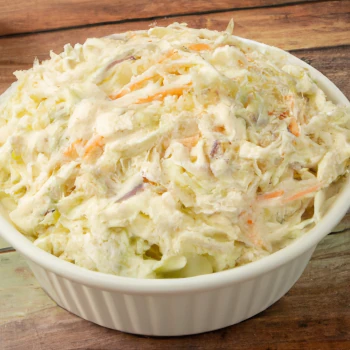Granny's Classic Coleslaw

Step into a world of timeless culinary delight with Granny's Classic Coleslaw. This cherished recipe, a testament to the enduring allure of home-cooked meals, has been a cornerstone of family feasts for generations. It's more than just a dish; it's a celebration of love, tradition, and the simple joy of creating something truly delicious from humble, wholesome ingredients.
Granny's Classic Coleslaw is a harmonious medley of taste and texture. Crisp, vibrant cabbage and carrot are meticulously sliced and shredded, their natural freshness enhanced by a perfectly balanced tangy dressing. A hint of onion lends a delicate sweetness, elevating this classic salad to a gastronomic masterpiece.
Be it a lively outdoor picnic or an intimate family dinner, Granny's Classic Coleslaw is a dish that resonates with comfort and joy. Each bite is a nostalgic journey, a reminder of the simple pleasures that come from a meal made with love.

Ingredients
1 head green or red cabbage (2 pounds), quartered and cored 1 carrot, peeled ½ small onion, halved through root end Salt and pepper ½ cup mayonnaise ¼ cup sour cream 1 tablespoon distilled white vinegar 2 teaspoons sugar
Method
- 1. Using a food processor, slice the cabbage and shred the carrot and onion. Combine these in a large colander and sprinkle with 2 teaspoons of salt. Let this mixture sit for at least 1 hour, or up to 4 hours, until wilted.
- 2. Rinse the cabbage mixture under cold water. Press gently to drain and blot dry with paper towels.
- 3. In a large bowl, whisk together the mayonnaise, sour cream, vinegar, sugar, and ¼ teaspoon of pepper.
- 4. Add the cabbage mixture to the bowl with the dressing and toss to coat. Refrigerate the coleslaw until chilled, about 30 minutes. Season with additional salt and pepper to taste before serving.

Deconstructing Coleslaw
Coleslaw, a cherished component of family feasts and outdoor picnics, boasts a rich and diverse history that mirrors the myriad ways it can be crafted. Its origins span across various global cuisines, where it has long enjoyed its popularity as a refreshing side dish.
Cabbage, a leafy green or purple plant, has been a staple in diets around the world for thousands of years. The cultivation of cabbage can be traced back to 6000 B.C. in China. It was later grown in the Mediterranean regions by the Greeks and Romans around the first millennium BC. The Romans, in particular, held cabbage in high regard for its medicinal properties. They believed it could be a remedy for various health conditions, from gout to intoxication.
The word "cabbage" comes from the French term "caboche," meaning "head," referring to its round shape. As trade routes expanded, so did the spread of cabbage across Europe and eventually to the Americas. It was in these new lands that cabbage found its way into a variety of dishes, including the now-famous coleslaw.
The term "coleslaw" originated from the Dutch word "koolsla," where "kool" means "cabbage" and "sla" stands for "salad" – thus, "cabbage salad." The original Dutch recipe was likely quite simple, consisting of shredded cabbage tossed with vinegar. However, as the dish made its way to America, it began to evolve.
In the 18th century, a recipe for coleslaw consisted of shredded cabbage mixed with melted butter, vinegar, and oil. It wasn't until the mid-18th century, with the invention of mayonnaise, that coleslaw began to take on the creamy consistency we're familiar with today. The tangy, creamy coleslaw, as we know it in the United States, typically combines shredded cabbage and carrots with a dressing of mayonnaise, sugar, and vinegar.
Coleslaw has continued to evolve with variations including the addition of other vegetables, like onions and peppers, or the use of buttermilk, sour cream, or yogurt in the dressing. Some versions add in sweetness with apples or tanginess with pickles. Despite these variations, the essence of coleslaw remains the same: a refreshing, tangy salad made from humble, nutritious cabbage.
Today, coleslaw is a popular side dish in many cuisines, particularly at barbecues and picnics in the United States. It's also a common topping for sandwiches and hot dogs. From its ancient roots to its modern interpretations, the history of cabbage and coleslaw is a testament to the enduring appeal of simple, versatile ingredients.
Tips, Tricks, & Serving Suggestions
- Choosing the Right Cabbage: Look for cabbage that is firm and bright in color. Avoid those with cracks or blemishes. Fresh, young cabbage is often sweeter and more tender.
- Shredding the Cabbage and Carrot: A food processor will make quick work of shredding the cabbage and carrot, but you can also use a box grater if you prefer. Just watch your fingers!
- Dressing: The base of the dressing is a mix of mayonnaise and sour cream, but you can experiment with different types of dressing for different flavors. Remember to season your dressing well with salt, pepper, and your favorite herbs and spices.
- Add-Ins: Coleslaw is incredibly versatile. Feel free to add in other vegetables like bell peppers or radishes. For a sweet and tangy twist, try adding some raisins or dried cranberries.
- Chilling Time: Coleslaw tastes best after it has been chilled in the refrigerator for a few hours. This allows the flavors to meld together. If possible, make your salad the day before you plan to serve it.
- Serving Suggestions: Coleslaw is the perfect side dish for barbecues and picnics, pairing well with grilled meats and sandwiches. It can also be served as part of a cold buffet or as a filling for wraps and pita bread.
- Presentation: Garnish your coleslaw with a sprinkle of fresh herbs like parsley or dill to add a pop of color before serving.
Remember, the best coleslaw is the one that you and your family love, so don't be afraid to experiment and make it your own!